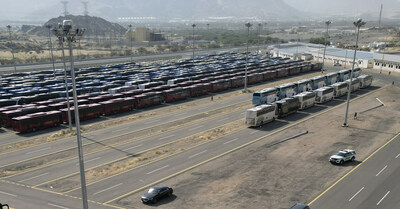It is that time of the year again when Saudi Arabia comes under global spotlight with the annual Muslim Hajj pilgrimage approaching, an event on which the Kingdom is expected to host 2.5 million devotees from 193 countries.
While success in organizing the annual Hajj is not uncommon for Saudi Arabia, yet millions of pilgrims still require high quality means of transportation with exceptional fluidity at the holy sites, which are expected to be the most crowded cities in the world, relative to area and time. According to data released by the Metropolitan Transportation Authority (MTA), 5,780 public buses currently operate in New York City, transporting around 1.2 million passengers on daily basis within an area that measures tens of times that of the combined area of the valley of Mina, Mount Arafa, and Muzdalifah in Saudi Arabia.
Elsewhere, on the eastern bank of the Atlantic Ocean, Transport for London (TfL) declares on its website that it is committed to transporting 5.7 million passengers everyday via 9,300 buses, while Milan prides itself of having one of Italy's largest railway networks, moving almost 1.15 million travellers every day. However, compared to the far more challenging numbers the Kingdom must deal with, the mission at the holy sites remains significantly harder for the Saudi Ministry of Hajj and Umrah who takes up the task of coordinating between authorities, receiving pilgrims, and creating solutions for their transportation.
Said challenge goes beyond just providing transportation options between the holy sites, where the movement of 2.5 million devotees is largely linked to a strict schedule set to match the Hajj rituals. The Kingdom has in recent years strengthened its transportation services, including the launch of the Holy Sites Train, which completed 2,170 trips in 2019, according to Saudi media.
Furthermore, the Ministry had successfully executed a grouping simulation on May 23, 2023 in presence of the Minister of Hajj and Umrah Tawfiq Al Rabiah, under whose supervision the simulation succeeded in simultaneously group 3,000 shuttle and conventional buses. The simulation included the following stages: dispersals from the pilgrims' residences in Mecca to Mina, ascending Mount Arafa from the valley of Mina, descending to the plain of Muzdalifah, returning from Muzdalifah to Mina, and finally heading to the Grand Mosque of Mecca to perform the farewell circumambulation.












